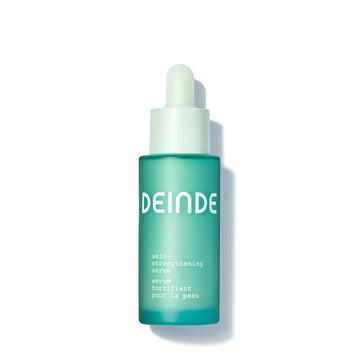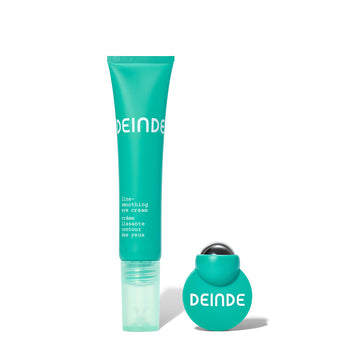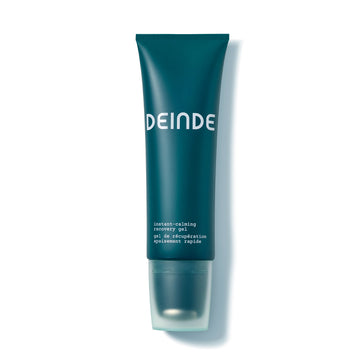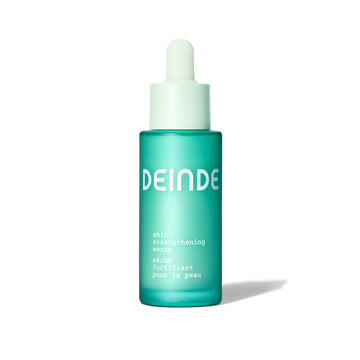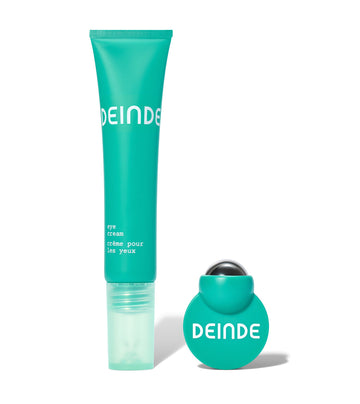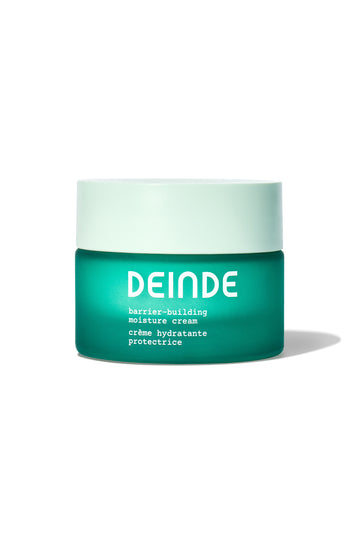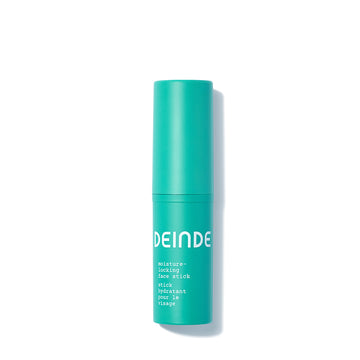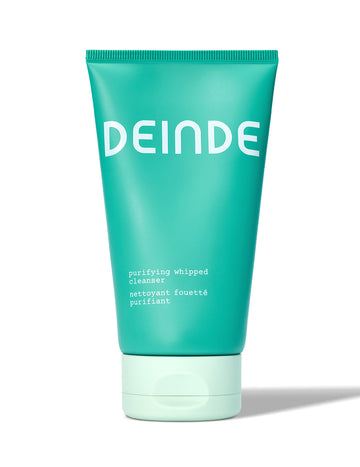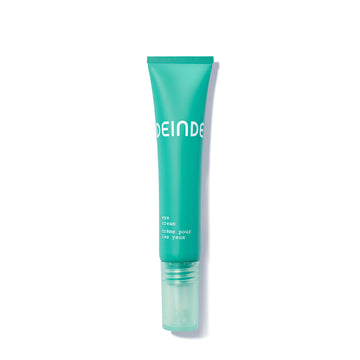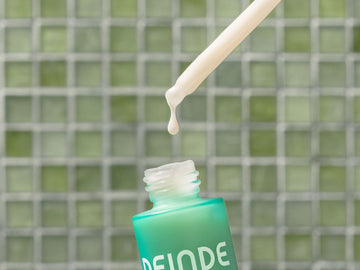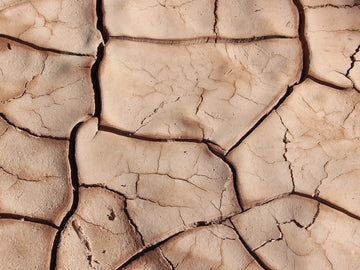
How Inflammaging Causes Dry Skin: The Best Skincare Routine for Parched Skin
Our skin is intelligent — it lets us know when something just isn’t right. That unexplainable tightness of skin, the flaky patches, the eternal battle between applying moisturizer and actually feeling like you’re making an impact… these are all signs that it’s time to commit to fixing your dry skin.
Why Does Skin Become Dry?
Dry skin, medically referred to as ‘xerosis curtis,’ is a common dermatological condition that’s a result of various intrinsic and extrinsic factors.
Skin becomes dry due to underlying causes and daily habits that encourage the accumulation of dead skin cells on the surface, which block the healthy regeneration of new skin cells and lead to a dull, dry, and ashy appearance.
Note that there is a difference between dry and dehydrated skin. Dry skin lacks oil because it's not being naturally produced — to fix this, you’ll need to incorporate products to encourage skin to hold in moisture. Dehydrated skin means that skin is unable to retain water — this can be fixed by hydrating via water consumption and external products.
While it’s difficult to break down the exact timeline of skin becoming dry, the following are widely understood as key reasons:
→ Loss of Natural Moisturizing Factors (NMFs)
When skin faces activities or inputs that weaken the moisture barrier, NMFs become depleted. These activities include excessive bathing, using harsh cleansers, or consistent exposure to environmental stressors.
→ Decreased Sebum Production
The sebaceous glands in our skin produce sebum, an oily substance that keeps skin moisturized. More importantly, sebum acts as a barrier against moisture loss. In addition to the natural aging process, genetics and hormonal imbalance play a role in decreasing this production.
→ Harsh Habits
Skin is sensitive — so using hot water and aggressively cleansing can place it in a fight or flight state when essential oils are stripped. Without a balanced oil composition, skin becomes incredibly vulnerable to moisture loss and irritants leaving it dry, tight, and prone to irritation.
→ Medications & Underlying Medical Conditions
Side effects of certain medications — especially those with diuretics and antihistamines — are recognized to interfere with hydration levels. Underlying medical conditions (ex. eczema) tend to cause inflammation, hormonal imbalances, or changes in the skin's cell turnover rate, making it difficult for skin to maintain proper moisture levels.
How Are Dry Skin and Inflammaging Related?
As a reminder, inflammaging refers to chronic, low-grade inflammation. This persistent silent, unseen inflammation is driven by a range of factors, including cellular damage, oxidative stress, and senescent cell accumulation. Ongoing inflammaging disrupts the skin’s natural defense mechanisms, making it prone to moisture loss and irritation.
DEINDE was formulated to interrupt this unnecessary and compounding cycle that carries a range of skincare problems: from flare-ups, to signs of accelerated aging like fine lines and dull skin, to dry skin as well. It’s worth remembering just how biologically complex skin really is. Containing a multitude of functions — from regulating temperature to housing nerve endings — many key skin conditions are intertwined.
With an inflammaging lens, we see the relationship between dry skin and low-grade chronic inflammation summed up below:
→ Collagen breakdown
Collagen, the protein responsible for maintaining skin firmness and elasticity, plays a pivotal role in encouraging dry skin. When the body contains less collagen, skin is physically less able to retain moisture, resulting in parched and flaky skin exceptionally sensitive to external elements. As we age, our body develops collagen at a declining rate. This declining collagen is accelerated when skin faces inflammaging, resulting in drier skin.
→ Skin Barrier Dysfunction
The skin barrier is the body’s first line of defense. Layers of lipids and cells work together to seal in moisture and combat external irritants like pollutants. When this barrier becomes compromised — which occurs when skin is dry — these layers become less efficient and allow water to escape while irritants enter. Through a cascading effect, dry skin becomes inflamed and irritated.
→ Impaired Wound Healing
When the body experiences trauma and is already in a state of inflammaging, skin likely lacks the necessary moisture content and suppleness for the normal wound healing process.
→ Redness and Irritation
Inflammaging is the body’s inflammatory response. An inflammatory system in flux can exacerbate existing skin conditions, like dry skin, making the body even more prone to irritation.
The Dry Skin Routine

Our skin is eternally exposed to the elements — pollution, dirt, UV rays, etc. This is where a dedicated dry skin routine is critical to unlocking a supple and truly hydrated complexion. The key to addressing dry skin is prioritizing serious hydration through both lifestyle and skincare product choices while addressing and preventing low-grade chronic inflammation. While there are many ways to do one thing, the following is DEINDE’s dry skin routine:
→ Gentle Cleansing
The essential step to create a blank, healthy canvas. Daily cleansing, morning and evening, is the gentle removal of environmental inputs like dirt or toxins. Traditional facial cleansers tend to exhibit two extremes — either leaving a film-like residue or stripping skin due to high surfactant levels. It’s important to gravitate towards sulfate-free, gentle cleansers to ensure you aren’t stripping the skin of its natural oil or protective barrier. When the skin barrier is compromised due to over stripping, the skin often reacts with increased inflammation and sensitivity.
The DEINDE method → gently apply, massage into a lather, rinse with lukewarm water, pat dry with a towel. AM+PM.
→ Exfoliate
Dry skin often results from the accumulation of dead skin cells, which lead to a dull and flaky complexion. DEINDE gravitates towards gentle PHA-based exfoliants every few days to remove these dead cells and impurities. Exfoliation is known to enhance skin barrier function by shedding dead keratinocytes — these are cells responsible for forming keratin, the skin's protective barrier.
The DEINDE method → always exfoliate with wet skin, as it allows for better, deeper exfoliation.
→ Hydrating Toner
Introduce serious hydration with a toner that has been formulated to rebalance skin pH levels as well as deliver moisture to leave your skin feeling nourished. Lightweight, water-based hydrating toners contain ingredients like hyaluronic acid or botanical acids that do an excellent job of replenishing moisture and prepping the skin for additional products to strengthen the skin barrier and reduce impacts of inflammaging. Look for products that contain ceramides or fatty acids to prevent the introduction of irritants and allergens.
The DEINDE method → Apply gently using an upward and outward motion from the center of your face outwards. Pat, never rub. AM + PM.
→ Serum
Daily application of a serum nourishes and softens, while soothing and hydrating. Serums can play a key role in encouraging a strong and intact skin barrier that’s prepared to face external stressors.
The DEINDE method → Apply a dime-sized portion on fingertips, massage into skin. AM + PM.
→ Moisturizer
A great face moisturizer replenishes water levels, alleviates dryness, and acts as a protective barrier for damaged skin.
The DEINDE method → apply and massage into skin.
→ Sunscreen
Dry skin is synonymous with a compromised skin barrier. Unless you live your life exceptionally indoors, your skin is likely facing the consequences of UV exposure. When skin is dry, it becomes vulnerable to UV-induced damage and worsens signs of inflammaging, making sun protection even more important.
The DEINDE method → SPF levels reference how much UV light a sunscreen can filter. The higher the SPF number, the more protection against UV exposure it offers, and a minimum of SPF 30 is generally recommended. Apply diligently and often to maintain the protection your skin needs — SPF is a necessary step in your dry skin routine!
A Note of Lifestyle Considerations
There are so many iterations of dry skin routines to consider — while the above is the DEINDE methodology, we encourage trying what works for you and your skin type. If you have particularly sensitive skin, for example, you may want to lean into more products that are fragrance-free. Remember, your skin knows what it needs — how are you listening?
Studies cited:
- Dry skin - Symptoms and causes | Mayo Clinic
- Xeroderma - StatPearls | NCBI Bookshelf
- Dry skin: Who gets and causes | AAD


